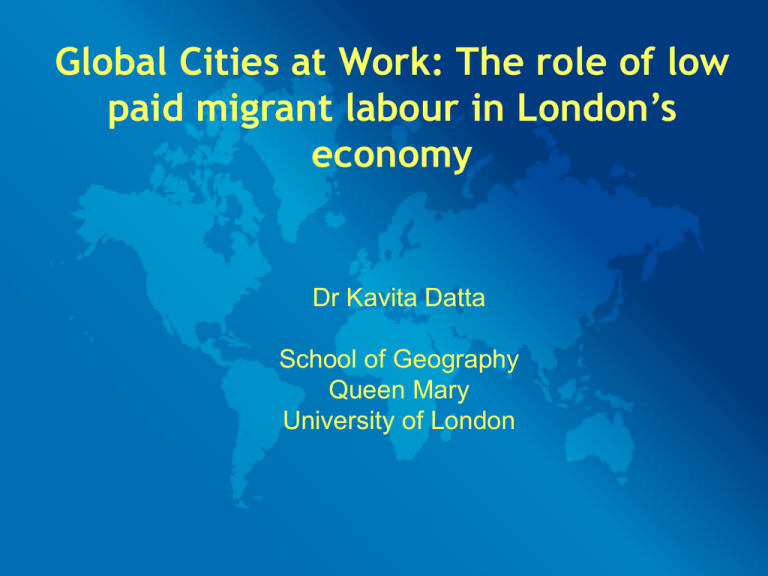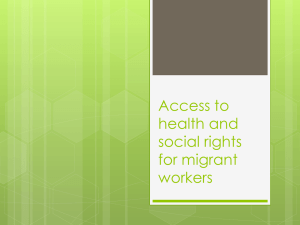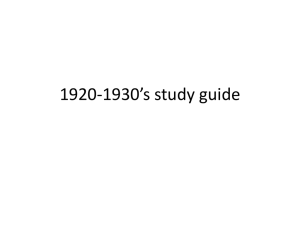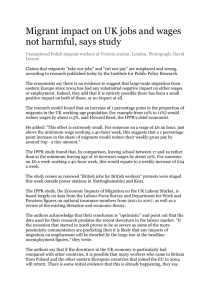Global Cities at Work: The role of low economy Dr Kavita Datta
advertisement

Global Cities at Work: The role of low paid migrant labour in London’s economy Dr Kavita Datta School of Geography Queen Mary University of London Aims of Presentation • Examine the processes through which London’s low wage economy has come to rely upon migrant men and women • Identify low paid migrant workers • Highlight the working conditions of these men and women Research Project: Global Cities at Work • Funded by the Economic and Social Research Council (2005-2007) • Research team • Professor Jane Wills, Professor Jon May, Dr Cathy McIlwaine, Dr Joanna Herbert and Dr Yara Evans • Research aims • investigate the role, experience and wider significance of migrant workers in London’s low wage economy Methodological Framework • 429 questionnaire interviews; 103 in-depth interviews, 31 key informant interviews • Respondents drawn from Cleaning (offices and LU), Hospitality (hotels and catering) Domiciliary care Construction and Food processing • Development of new data sets based on the Labour Force Survey and an analysis of wages taken from the Annual Survey on Hours and Earnings Global cities and migrant workers: the emergence of a migrant division of labour • Political-economic restructuring and the increased role of migrant workers in global cities’ labour markets (Saskia Sassen 1991) • Exceptionalism of European cities (Chris Hamnett 2003) • However, over last decade, London’s labour market exhibiting professionalization, economic activity as well as growth of working poor = MDL Proportions of foreign born labour by occupation in London Occupation 1993/94 1991/2000 2001/02 2004/05 Chefs, cooks 51% 61% 67% 76% Catering assistants 42% 52% 55% 62% Care assistants n/a 48% 38% 56% Cleaners 41% 46% 61% 69% All London 25% 27% 30% 34% UK 7% 8% 9% 10% Factors leading to migrant division of labour • Labour market deregulation • Welfare reform • Growth in migration 1) Labour market reform • Transformation of British economy in last three decades • Changing nature of employment – permanent to temporary, full time to part time, increased polarization • Characterised by subcontracting and deteriorating conditions of work 2) Coupled with welfare reform • ‘Work ethic’ and welfare reform under New Labour • Reductions in both the real value of benefits as well as the number of people eligible for benefits designed to create more flexibility at work so as to boost the supply of low paid labour • Yet, such initiatives had little impact on either unemployment or economic inactivity with employers particularly reporting shortages in the bottom end of the market. 3) Immigration trends • Export of neoliberal policies to Global South in 1980s •UK became country of net immigration in 1980s • Rate of immigration began to rise markedly in mid-1990s London and migrant labour • London as a particular destination for migrants – by 2001, 42% of migrants settled in London (Spence 2005) • By 2006, 31% of city’s population and 35% of working age population were foreign born (Spence 2005) • Attempts to manage this migration through the adoption of managed migration policies and a points based system Immigration reform • Points based system reflects 3 key immigration priorities: • Cherry picking of highly skilled migrants from global market • Clamping down on ‘bogus’ asylum seekers and irregular migration • Expansion of European migration over and above migration from Global South • Hierarchy of rights among migrant workers Who are low paid migrant workers? • Recent arrivals One-half arrived in the UK in or after 2001 Over one-third (36%) migrated to UK between 1991- 2000 • Super-diversity: migrants came from 63 countries with significant numbers coming from Africa (Nigeria, Ghana), Latin America/the Caribbean (Colombia, Brazil, Jamaica) Asia (Sri Lanka) and Eastern Europe (Bulgaria, Poland, Lithuania) Map showing country of origin of migrants Migrant division of labour interplays with gender and racial division of labour ¾ of cleaners on the Underground: Black Africans ¼ of office cleaners: Latin America over ¼ of workers in hospitality: Eastern Europe Most workers in construction: Brazilians and Poles Women predominantly employed in ‘semi-private’ spheres (care and hospitality), men in ‘semi-public’ spaces (construction) Managers and supervisors reinforce clustering (and stereotyping) by recruiting within their own ethnic groups: Carlos, a cleaner from Honduras, reported that his Bolivian supervisor only employed Latin Americans Barbara, a care worker from St Lucia reported her Ghanaian manager preferred to employ Ghanaians Low paid work from the perspective of migrant workers • Migrant workers concerned about low rates of pay, poor conditions of work, a lack of respect and dignity at work and divided workplaces • Pay – majority earned the NMW (£4.85 at the time of the survey) Average earnings of £5.45/hr More than 90% earned below the London Living Wage (£6.70 per hour) Poor conditions of work – - One half no annual pay rise - One third never had pay rise - Half lost pay for taking time off for emergencies - Over half (52%) did not receive sick pay - Two thirds (67%) received statutory minimum paid annual leave (20 days inc bank holidays or fewer days) - Over two thirds (70%) had no access to company pension scheme - Over half (55%) worked unsociable hours Lack of respect and dignity “many people think that we immigrants are used to cleaning in our country but there are many immigrants who were solicitors, accountants, and in different professions. We are not just worth nothing, we have some value.” (Pedro, office cleaner from Brazil) “You’re [migrants] are portrayed as all these criminals, and yet we actually hold the keys to all of these buildings, ‘cause we are the cleaners. We are the guards. We lock up and we close down. And we are so untrustworthy? …If Africans went on strike, there’d be no security men, there’d be no trained nurses on the wards, there’d be no cleaners, there’d be…no traffic wardens. All the jobs that nobody else wants to do.” (Interview with representative of the Central Association of Nigerians in the UK) Divided workplaces • Evidence of tensions between workers and supervisors, managers and clients • Evidence of ethnic and nationality competition among migrant workers, often linked with racism • Adesola, from Nigeria reported that: ‘Now they’ve introduced people from Romania, Bulgaria, they brought them in, what they do is when they bring them in, they remove some of these Africans, they tell them these people are Europeans and they have better right to work than you… Because these people when they come in, they don’t care how much you pay them.’ • “Black people, who I consider, see us as a threat. We are white, usually better educated. English, who, I think are not officially racist, but are rather open, would prefer to employ Polish, who work harder then a black person…I am coming here to work and I can work legally as a citizen of a member state of the European Union, while others often are here because of prosecution or had to escape war” (Mirek, Polish construction worker) This said.. • Earnings in London compared favourably to those in home countries – “Money-wise, you know here is better. If you compare the pay scale here to back home, it’s better paid here.” (Janet, care worker, Jamaica) • Acquire goods necessary for a good life – “What I managed to achieve here in one year, I would achieve there in five or six. It sped things up a lot.” (Luis, Brazilian cleaner) • Advantages of living in a global city • You get a lot of experience in London. You know people from around the world. You have an idea of how the world is…Perhaps you don’t realize that when you come from another country like Mauritius, a small island but the fact that it is small gives you…a narrow perspective on life….When you come to London you see the world as it is, large, big and [while] the difficulties are big, the prospects are also big. You get a new perspective on life. (Vijay, care worker) Conclusions • Migrant division of labour outcome of complex interplay of global and local neoliberal economic restructuring; associated increase in transnational migration and changes to welfare state • Despite significance of low paid employment to functioning of London’s economy, contributions of migrant workers often unacknowledged and invisible • Need to value low paid work and migrants Project outputs • Global Cities at Work: new Migrant Divisions of Labour (Pluto Press: 2010) • Details of published journal articles, book chapters and working papers available from:http://www.geog. qmul.ac.uk/globalcities /index.html




